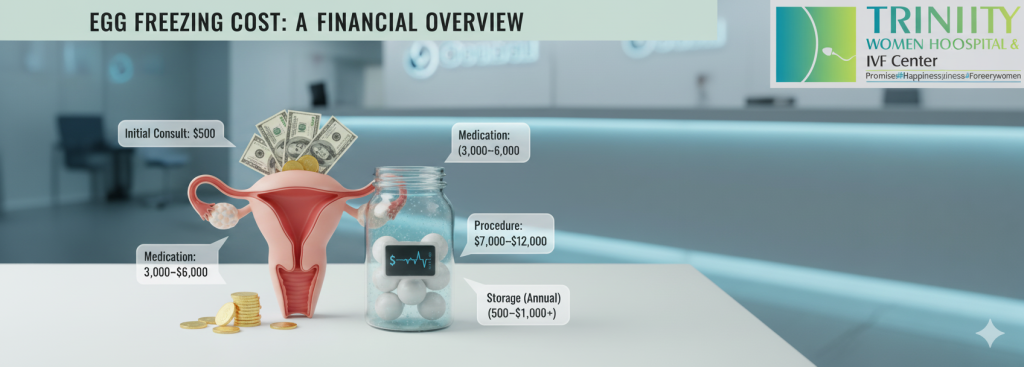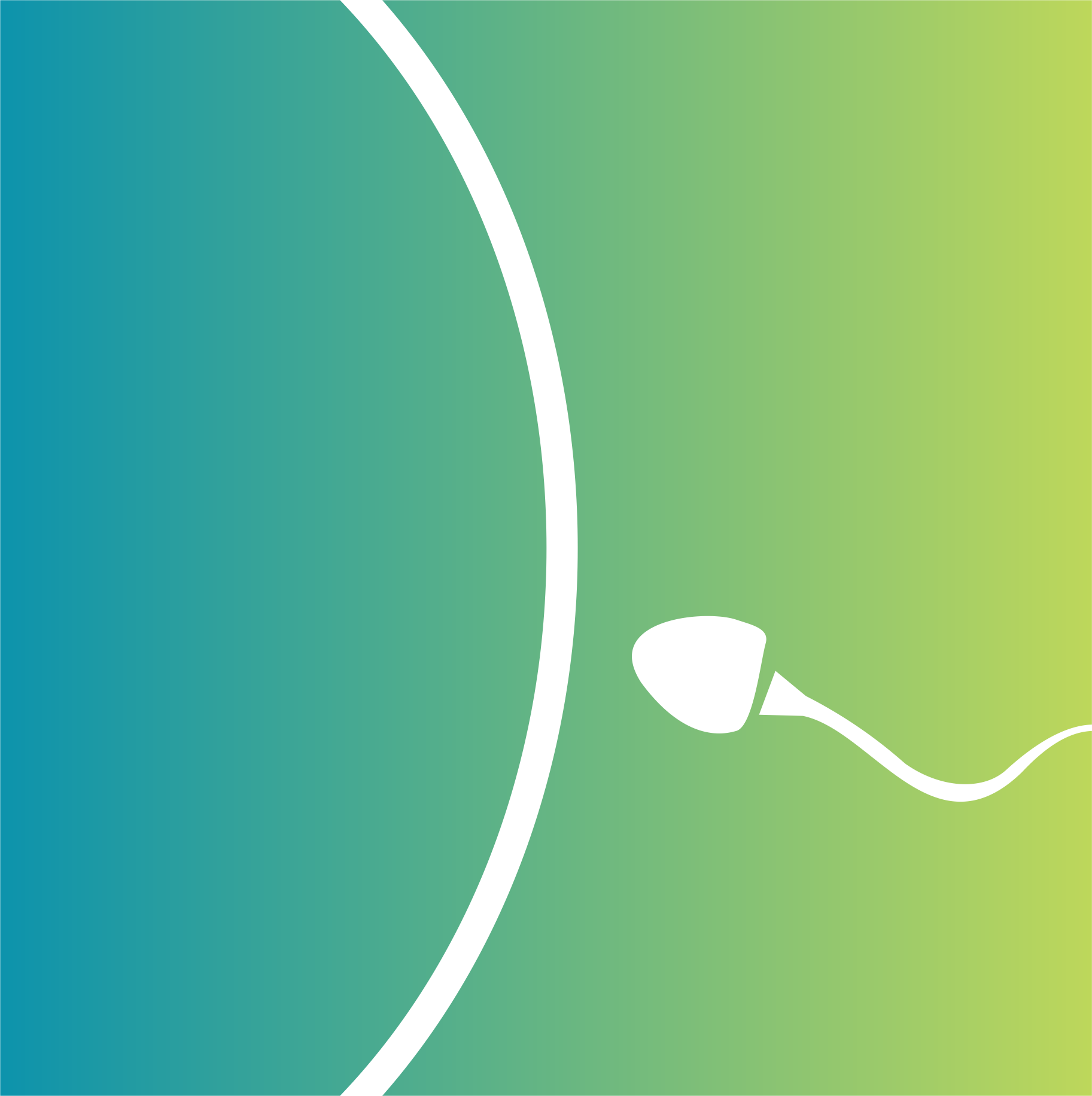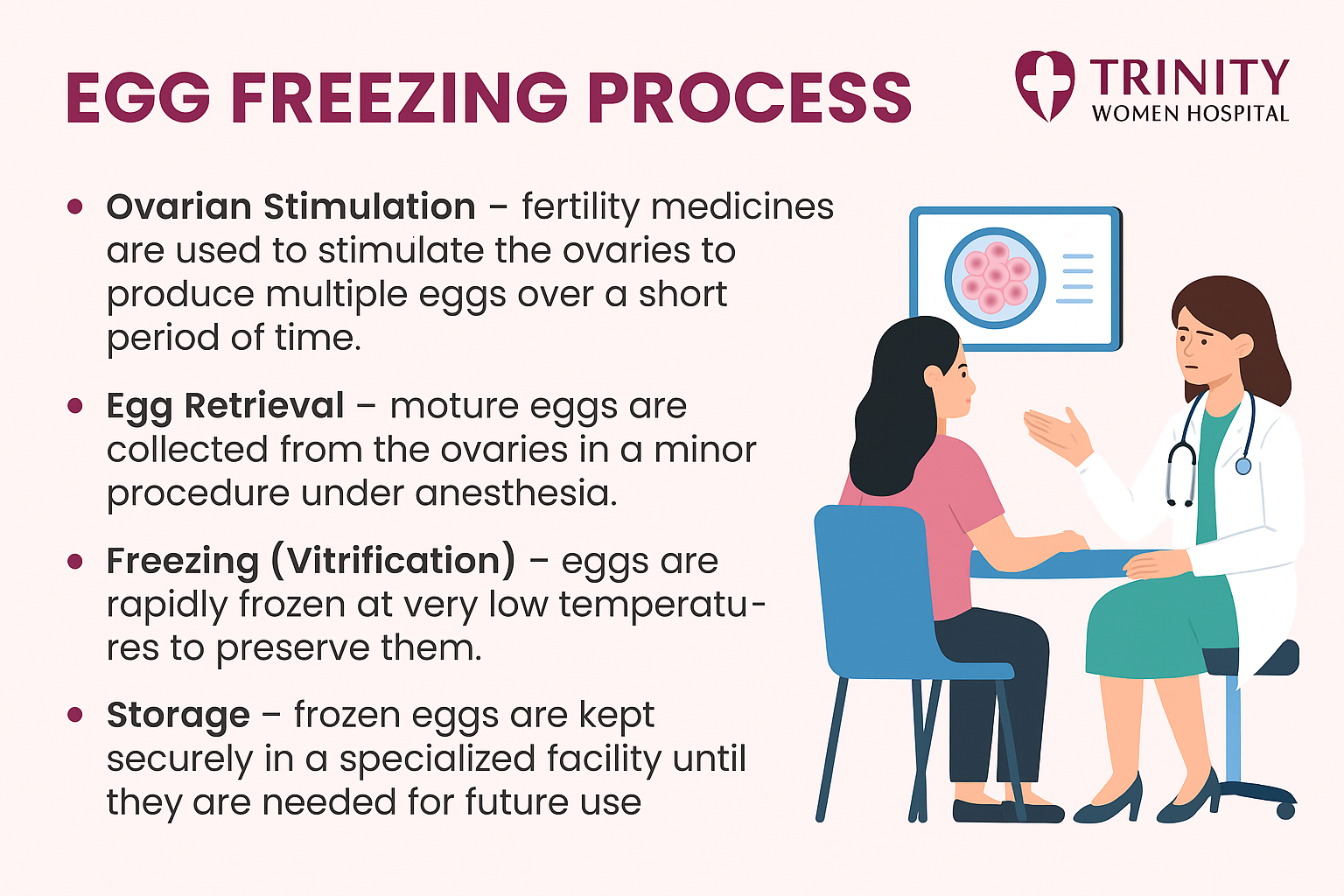Egg Freezing Cost – Having a baby is a lovely dream, but sometimes the time just doesn’t seem right. Many women today prioritize education, career, or personal aspirations before having children. For others, medical issues such as PCOS, cancer, or low ovarian reserve cause them to fear future fertility. That’s where egg freezing comes into the picture.
At Trinity Women Hospital, we support women through egg freezing with empathy, cutting-edge technology, and complete transparency regarding prices. In this blog, let’s break down what egg freezing is, how the process works, what it costs in India, and when physicians suggest it.

What is Egg Freezing
Egg freezing, or oocyte cryopreservation, is a medical procedure where a woman’s eggs are:
- Retrieved from her ovaries
- Frozen using advanced techniques
- Stored for future use
Later, when she’s ready to conceive, the eggs are thawed, fertilized with sperm, and implanted into the uterus via IVF.
This gives women both liberty and assurance—knowing that their fertility remains intact despite age or medical conditions. At Trinity Women Hospital, we view egg freezing not merely as a procedure but as an empowering choice for women to take control of their fertility journey.
Egg Freezing Process
The process usually takes 2–3 weeks from start to finish. It involves four simple steps:
- Ovarian Stimulation – Fertility medications are administered for 10–12 days to stimulate the ovaries to develop multiple eggs. Regular scans and blood tests are done to track progress.
- Egg Retrieval – Mature eggs are collected through a minor procedure under anesthesia. It’s safe, quick, and most women can resume normal activities within a day.
- Freezing (Vitrification) – Eggs are frozen at very low temperatures using advanced techniques. This locks the eggs in their current state, preserving their quality for years.
- Storage – Frozen eggs are securely stored until the woman is ready to use them for IVF in the future.
At Trinity Women Hospital, our fertility experts ensure safety, comfort, and emotional support at every stage of the egg freezing process. Women often ask about the egg freezing cost, and we provide full transparency. The cost typically covers stimulation medicines, egg retrieval, freezing, and the first year of storage. While the upfront egg freezing cost may feel like a significant expense, many women consider it a smart investment in their fertility. Freezing eggs when they are younger reduces the need for multiple IVF cycles later, which can be far more costly both financially and emotionally.
By choosing egg freezing at the right time, women gain not only peace of mind but also better value from the procedure—ensuring their healthiest eggs are preserved for future motherhood.
Egg Freezing Cost in India
Egg freezing prices in India vary depending on hospital facilities, medicines, and storage duration. On average, it costs between ₹1.5 lakh to ₹2.5 lakh per cycle.
- Initial Process (stimulation + retrieval + freezing): ₹1.2–1.8 lakh
- Annual Storage Charge: ₹25,000–₹40,000 per year
- Cost of IVF (if eggs are later used): Additional, depending on treatment plan
At Trinity Women Hospital, we maintain cost transparency so women can plan clearly without hidden charges. We also guide women on how many eggs should be frozen to maximize the chance of future pregnancy.
When is Egg Freezing Advisable?
Egg freezing is not for everyone, but it’s highly beneficial in the following cases:
- Women postponing pregnancy for professional or personal reasons
- Women with PCOS or irregular ovulation but good ovarian reserve
- Cancer patients requiring chemotherapy or radiation (which may harm fertility)
- Women with a family history of premature menopause
- Couples not ready for children but wanting to preserve fertility
Doctors usually advise freezing eggs before age 35, when egg quality and quantity are higher. At Trinity Women Hospital, we offer personalized fertility testing to help women decide the right timing.
Emotional and Practical Benefits
Egg freezing provides women with reassurance and reduces the anxiety of the “biological clock.” Many women share with us at Trinity Women Hospital that they feel empowered after freezing their eggs, knowing they can still become mothers later in life.
It’s not just about postponing pregnancy—it’s about giving yourself options. Whether you use the frozen eggs or not, the procedure itself offers peace of mind and emotional security. For many women, the decision to freeze eggs is also a financial and emotional investment. While the egg freezing cost may seem high at first, it is often viewed as a way of securing future fertility and avoiding repeated failed treatments later. By freezing eggs when younger, women reduce the need for multiple IVF cycles in the future, which can be more expensive and emotionally draining.
At Trinity Women Hospital, we see egg freezing as more than just a medical procedure—it is about protecting dreams and providing women with control over their fertility journey. The sense of relief and confidence women gain often outweighs the cost, because it ensures they have preserved their healthiest eggs for when the right time to start a family arrives.
FAQs | Egg Freezing Cost
Q1. How long can frozen eggs be stored?
Frozen eggs can be preserved safely for 10–15 years or longer without losing quality. At Trinity Women Hospital, we use advanced vitrification technology, which is a rapid freezing method that prevents ice crystal formation. This helps maintain egg quality even after long-term storage.
In fact, many studies show that eggs frozen for 10+ years work just as well as those used within a shorter timeframe. The important factor is not how long the eggs are stored, but the age of the woman when the eggs were frozen. Younger eggs have better quality and higher chances of resulting in pregnancy later. Trinity Women Hospital ensures that eggs are stored in a safe, secure, and monitored environment, giving women peace of mind that their fertility is well protected.
Q2. Is egg freezing painful?
Most women are surprised to learn that egg freezing is not very painful. The process involves two parts: daily hormone injections for around 10–12 days to stimulate egg growth, and a minor egg retrieval procedure under anesthesia. The injections may feel like small pinches, similar to insulin shots, while the retrieval is done safely while the woman is asleep, so there is no pain during the procedure.
At Trinity Women Hospital, women often describe the process as “slightly uncomfortable but manageable.” Some may feel mild bloating, mood changes, or cramps—similar to a menstrual cycle. With proper medical care, pain relief, and emotional support, the experience becomes much easier. Our team ensures that every woman feels comfortable, informed, and cared for throughout her egg freezing journey.
Q3. Does egg freezing guarantee pregnancy?
No fertility treatment, including egg freezing, can guarantee pregnancy. However, freezing eggs at the right age significantly increases the chances of a successful pregnancy later. The success depends on several factors such as egg quality, sperm quality, and the woman’s health when she decides to use the eggs.
At Trinity Women Hospital, we maximize chances by recommending egg freezing before age 35 and offering embryo screening (PGT-A) when needed to ensure healthy embryos. Many women who froze their eggs young have been able to achieve pregnancy through IVF years later. While it cannot promise 100% success, egg freezing is one of the best ways to protect fertility and keep the dream of motherhood alive for the future.
Q4. What is the best age to freeze eggs?
The ideal age to freeze eggs is before 35 years, when egg quality and quantity are at their best. Younger eggs have higher chances of fertilization and developing into healthy embryos. Women over 35 can still benefit from egg freezing, but the chances of success are lower because egg quality naturally declines with age.
At Trinity Women Hospital, we provide fertility assessments including ovarian reserve tests (like AMH levels and antral follicle count) to guide women individually. This ensures that women get personalized advice on whether egg freezing is right for them, and how many eggs should ideally be frozen to secure their future fertility. By planning at the right time, women can feel more confident about delaying pregnancy without losing the chance of becoming mothers later.
Q5. Are women with PCOS likely to benefit from egg freezing?
Yes, women with PCOS (Polycystic Ovary Syndrome) can greatly benefit from egg freezing. Most women with PCOS have a good ovarian reserve, which means they can produce multiple eggs. However, irregular ovulation often prevents them from conceiving naturally. Freezing eggs at a younger age helps them preserve their fertility and ensures healthy eggs are available for future IVF treatment.
At Trinity Women Hospital, we regularly guide women with PCOS through egg freezing and IVF. By storing eggs when they are younger, PCOS patients avoid the risks of declining egg quality with age. Later, when they are ready for pregnancy, they can use these eggs in IVF, giving them a much higher chance of success and peace of mind about their fertility future.
Conclusion
Egg freezing is a modern solution for women who want to preserve fertility and plan pregnancy on their own terms. The procedure is safe, effective, and growing in popularity across India.
At Trinity Women Hospital, we combine medical expertise, advanced labs, and compassionate care to help women make informed decisions about egg freezing. Whether you’re considering it for career, health, or personal reasons, we’re here to guide you.
Motherhood is always your decision—and egg freezing lets you keep that decision open for the future.

